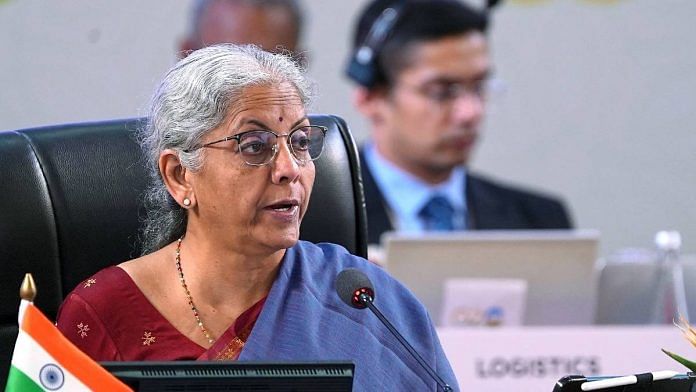New Delhi: The third meeting of the G20 finance ministers and central bank governors (FMCBG) in Gandhinagar concluded Tuesday with agreement on a wide range of issues, including a common debt framework, the implementation of an international crypto framework, and the enhancement of multilateral development banks.
However, the members still could not reach a consensus on the Russia-Ukraine war, with most condemning it, but Russia and China objecting to the language used in the common statement issued by the FMCBG. This issue prevented the FMCBG from issuing a communique, which is considered a stronger document of intent, and instead restricting themselves to a summary statement.
“The chair summary statement (as opposed to a communique) is because we still don’t have a common language on the Russia-Ukraine war and our position since February has been that we have derived the statement from the leaders’ statement that was arrived at in the Bali Summit (in November 2022), and the February Bengaluru statement was the feeder into this one,” Finance Minister Nirmala Sitharaman said at a press conference following the meeting.
“The language given in the Bali leaders’ summit, we don’t have the mandate to change that,” she added. “So it must be left to the leaders, during the summit in September, to take a call on that. Before that, we didn’t think it was right for us to change the language.”
The G20 Outcome Document and Chair’s Summary document issued late Tuesday evening contained two footnotes in which Russia and China’s objections were noted.
Also read: ‘Beautification’ to bulldozers, how Delhi is going all out to become showcase city for G20 summit
What was not agreed on
“China stated that the G20 FMCBG meeting is not the right forum to discuss geopolitical issues,” the first footnote stated, while the second said that “Russia dissociated itself from the status of this document as a common outcome because of references in paragraphs 2, 3 and 5”.
These paragraphs refer to the members’ condemnation of the war in Ukraine, the importance of upholding international humanitarian law, and the emphasis on the ongoing food and energy insecurity in the world, respectively.
“Since February 2022, we have also witnessed the war in Ukraine further adversely impact the global economy,” the G20 Outcome Document and Chair’s Summary document said in one of the paragraphs objected to by Russia and China. “We reiterated our national positions as expressed in other fora, including the UN Security Council and the UN General Assembly, which… deplores in the strongest terms the aggression by the Russian Federation against Ukraine and demands its complete and unconditional withdrawal from the territory of Ukraine.”
The contested paragraph went on to say that “most members strongly condemned the war in Ukraine and stressed that it is causing immense human suffering and exacerbating existing fragilities in the global economy constraining growth, increasing inflation, disrupting supply chains, heightening energy and food insecurity, and elevating financial stability risks”.
The contested paragraphs also highlighted the importance of upholding international law, including the principles enshrined in the charter of the United Nations, and the protection of civilians and infrastructure during armed conflict.
“The use or threat of use of nuclear weapons is inadmissible,” the paragraph added. “The peaceful resolution of conflicts, efforts to address crises, as well as diplomacy and dialogue are vital. Today’s era must not be of war.”
Agreement on debt, crypto & multilateral banks
While there was disagreement over the war in Ukraine and its impact, the G20 finance ministers and central bank governors were able to reach a consensus on some key economic and financial issues facing countries across the world.
“We re-emphasise the importance of addressing debt vulnerabilities in low and middle-income countries in an effective, comprehensive and systematic manner,” the document said.
“We continue to stand by all the commitments made in the [G20] Common Framework for Debt Treatments… and step up the implementation of the Common Framework in a predictable, timely, orderly and coordinated manner,” the document added.
The issue of debt-related stress in low-and-middle-income countries has become more urgent since the Covid-19 pandemic when many countries were forced to significantly increase their spending even though revenues suffered.
The Common Framework for Debt Treatments was arrived at by the G20 members in November 2020, following an extraordinary meeting of the G20 FMCBG to address the sharp increase in debt distress in low-income countries. The common framework sought to bring together debtor countries and their creditors on the same platform so as to address the distress in a coordinated manner.
“On Central Bank Digital Currencies (CBDCs), there is a perceptible change in thinking,” Reserve Bank of India Governor Shaktikanta Das said at the post-meeting press conference. “It is now recognised by a large number of countries, both G20 members as well as countries that are not members, that CBDC is an important aspect which needs to be looked at more seriously.”
He added: “Specifically with regard to cross-border payments, it was recognised that there is great potential for CBDC to facilitate easier, smoother and seamless cross-border payments and there is a need to take this agenda forward.”
The outcome document and chair statement also reiterated the members’ commitment to evolve and strengthen multilateral development banks (MDBs) to “address the global challenges of the 21st century with a continued focus on addressing the development needs of low- and middle-income countries”.
(Edited by Poulomi Banerjee)
Also read: PM Modi, G7 & Quad outline strong stance against China. Beijing lodges ‘stern representations’



